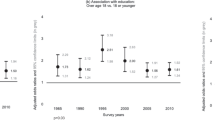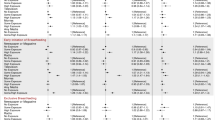Abstract
BACKGROUND/OBJECTIVES:
Infant feeding decisions made by new parents have significant health implications. The study aimed to investigate: influences on infant feeding decisions; characteristics of mothers reporting reliance on alternative information sources; associations between reliance on different sources and intentions to exclusively breastfeed and introduce complementary foods later; and subsequent breastfeeding and weaning behaviours.
SUBJECTS/METHODS:
First-time mothers in five European countries (England, Finland, Germany, Hungary, Spain) completed questionnaires about the importance of 17 influences on infant feeding choices at birth and 8 months later, during 2007–2008. Use of individual sources and reliance on four categories (family and friends, health professionals, written materials, audio-visual media) were compared between countries. Associations between information sources used and mother characteristics, feeding intentions and behaviours were investigated using appropriate statistical tests.
RESULTS:
In all, 2071 first-time mothers provided baseline data; 78% at 8 months. Variation exists between countries in the influence of different sources on feeding decisions of first-time mothers. Across all countries, the most important influences at both time points were books, partner and antenatal midwife. Mothers in higher income quintiles and remaining at school beyond age 16 years reported greater reliance on written sources (P<0.0005). Mothers relying most on written sources reported longer exclusive breastfeeding (P=0.002), and a tendency to introduce foods other than milk later (P=0.079) than mothers relying most on personal or professional contacts.
CONCLUSION:
Further research is required about which dissemination strategies are most effective at improving infant feeding behaviours in varied cultural settings, and for different socio-economic groups.
This is a preview of subscription content, access via your institution
Access options
Subscribe to this journal
Receive 12 print issues and online access
$259.00 per year
only $21.58 per issue
Buy this article
- Purchase on Springer Link
- Instant access to full article PDF
Prices may be subject to local taxes which are calculated during checkout
Similar content being viewed by others
References
American Academy of Pediatrics. Policy statement: breastfeeding and the use of human milk. Pediatrics 2005; 115: 496–506.
World Health Organisation. WHO Action Plan for Food and Nutrition Policy, 2007-2012. WHO Regional Office for Europe: Denmark www.euro.who.int (accessed 01 June 2012).
World Health Organisation. Global Strategy of Infant and Young Child Feeding. The Optimal Duration Of Exclusive Breast Feeding. WHO: Geneva, 2001.
Fewtrell MS, Morgan JB, Dugan C, Gunnlaugsson G, Hibberd PL, Lucas A et al. Optimal duration of exclusive breastfeeding: what is the evidence to support current recommendations? Am J Clin Nutr 2007; 85: 635S–638S.
ESPGHAN Committee on Nutrition. Complementary feeding: a commentary by ESPGHAN Committee on Nutrition. J Pediatr Gastroenterol Nutr 2008; 46: 99–110.
Cattaneo A, Yngve A, Koletzko B, Guzman LR . Protection, promotion and support of breastfeeding in Europe: current situation. Public Health Nutr 2005; 8: 39–46.
Nichol A, Thayaparan B, Newell ML, Rundall P . Breastfeeding policy, promotion and practice in Europe. Results of a survey of non-governmental organisations. J Nutr Environ Med 2002; 12: 255–264.
World Health Organisation Europe. Comparative analysis of food and nutrition policies in WHO European member states. Report. WHO: Geneva, 2003.
Cattaneo A, Williams C, Pallas-Alonso CR, Hernandez-Aguilar MT, Lasarte-Velillas JJ, Landa-Rivera L et al. ESPGHAN’s 2008 recommendation for early introduction of complementary foods: how good is the evidence? Matern Child Nutr 2011; 7: 335–341.
Chezem JC, Friesen C, Clark H . Sources of infant feeding information used by pregnant women. J Perinat Educ 2001; 10: 20–26.
Kong SF, Lee DT . Factors influencing decision to breastfeed. J Adv Nurs 2004; 46: 369–379.
Carruth BR, Skinner JD . Mothers’ sources of information about feeding their children aged 2 months to 5 years. J Nutr Educ Behav 2001; 33: 143–147.
Anker AE, Reinhart AM, Feeley TH . Health information seeking: a review of measures and methods. Patient Educ Counsel 2011; 82: 346–354.
McLeroy K, Bibeau D, Stckler A, Glanz K . An ecological perspective on health promotion programs. Health Educ Q 1988; 15: 351–377.
Synott K, Bogut J, Edwards GA, Scott JA, Higgins S, Norin E et al. Parental perceptions of feeding practices in five European countries: an explorative study. Eur J Clin Nutr 2007; 61: 946–956.
Daly A, MacDonald A, Booth IW . Diet and disadvantage: observations on infant feeding from an inner city. J Hum Nutr Diet 1998; 11: 381–9.
North K, Emmett P, The ALSPEC Study Team. Types of drinks consumed by infants at 4 months and 8 months of age: socio-demographic variables. J Hum Nutr Diet 2000; 13: 71–82.
Pain R, Bailey C, Mow IG . Infant feeding in North East England: contested spaces and reproduction. Area 2001; 33: 261–272.
Fewtrell M, Lucas A, Morgan J . Factors associated with weaning in full term and preterm infants. Arch Disease Childhood Fetal Neonat Educ 2003; 88: F296–F301.
Haslam C, Laurence W, Haefeli K . Intentions to breastfeed and other important health related behaviours and beliefs during pregnancy. Fam Pract 2003; 20: 528–530.
Altree P . Low income mothers nutrition and health: a systematic review. Matern Child Nutr 2005; 1: 227–240.
Stolzer J, Zeece P . Low income women and physician breast feeding advice: a regional assessment. Health Educ J 2006; 62: 126–134.
Bolling K, Grant C, Hamlyn B . Infant feeding survey 2005. NHS, Information Centre for Health and Social Care 2007 Internet http://www.ic.nhs.uk/statistics-and-data-collections/health-and-lifestyles-related-surveys/infant-feeding-survey/infant-feeding-survey-2005 (accessed 28 June 2010).
Beake S, Pellowe C, Dykes F, Schmied V, Bick D . A systematic review of structured compared with non-structured breastfeeding programmes to support the initiation and duration of exclusive and any breastfeeding in acute and primary health care settings. Matern Child Nutr 2011; 8: 141–161.
Fairbank L, O’Meara S, Renfrew MJ, Woolridge M, Sowden AJ, Lister-Sharpe D . A systematic review of the effectiveness of interventions to promote the initiation of breastfeeding. Health Technol Assess 2000; 4: 1–171.
Hamlyn B, Brooker S, Oleinikova K, Wands S . Infant Feeding 2000. The Stationery Office: London, 2002.
DiGirolamo AM, Grummer-Strauwn LM, Fein SB . Maternity care practices—implications for breastfeeding. Birth 2001; 28: 94–100.
DiGirolamo AM, Grummer-Strauwn LM, Fein SB . Do perceived attitudes of physicians and hospital staff affect breastfeeding decisions? Birth 2003; 30: 94–100.
Reeve JP, Gill SE, Johnson MH, Hunter S, Streater M . A preliminary study of the use of experiential learning to support womens’ choices about infant feeding. Eur J Obstet Gynecol Reprod Biol 2004; 113: 199–203.
Hannula L, Kaunaner M, Tarkka M-T . A systematic review of professional support interventions for breastfeeding. J Clin Nurs 2008; 17: 1132–1143.
Furber CM, Thomson AM . The emotions of integrating breastfeeding knowledge into practice for English midwives: a qualitative study. Int J Nurs Stud 2008; 45: 286–297.
Khoury A, Hinton A, Mitra A, Carothers C, Foretich C . Improving breastfeeding knowledge, attitudes and practices of WIC clinic staff. Public Health Rep 2002; 117: 453–62.
Cantrill RM, Creedy DK, Cooke M . An Australian study of midwives breastfeeding knowledge. Midwifery 2003; 19: 310–317.
Siddell E, Marinelli K, Froman RD, Burke G . Evaluation of an educational intervention on breastfeeding for NICU nurses. J Hum Lactat 2003; 19: 293–302.
Hoddinott P, Pill R . A qualitative study of womens’ views about how health professionals communicate about infant feeding. Health Expect 2000; 3: 224–233.
Ostry A, Young ML, Hughes M . The quality of nutritional information available on popular websites: a content analysis. Health Educ Res 2008; 23: 648–55.
Caroline Walker Trust. ‘I hear it is the closest thing to breast milk’ Caroline Walker Turst, Abbots Langley 2009: www.cwt.org.uk/pdfs/Formula_PTBReport.pdf.
McInnes RJ, Chambers JA . Supporting breastfeeding mothers: qualitative synthesis. J Adv Nurs 2008; 62: 407–427.
Shepherd CK, Power KG, Carter H . Examining the correspondence of breastfeeding and bottle feeding couples’ infant feeding attitudes. J Adv Nurs 2000; 31: 651–660.
Gisberg B, Meisters I, Knoffneryus JA, Legtenberg MHG, van Schagg CP . Factors influencing breastfeeding practices and postponement of solid food s to prevent allergic disease in high-risk children: results from an explorative study. Pat Educ Counsel 2005; 57: 15–21.
Lavender T, McFadden C, Baker L . Breastfeeding and family life. Matern Child Nutr 2006; 2: 145–155.
McLaren L, Hawe P . Ecological perspectives in health research. J Epidemiol Commun Health 2005; 59: 6–14.
Bettingham EP . Health promotion and the knowledge–attitude–behaviour continuum. Prev Med 1986; 15: 475–91.
Raats M . The role of consumers. In: Koletzko B, Koletzko S, Rummele F (eds): Drivers of Innovation in Pediatric Nutrition. Vol. 66, Nestle Nutrition Institute Workshop Series: Pediatric Program: Karger: Basel, Switzerland, 2010 pp 161–171.
Tully KP, Ball HL . Trade-offs underlying maternal breastfeeding decisions: a conceptual model. Matern Child Nutr 2011 e-pub ahead of print; doi:10.1111/j.1740-8709.2011.00378.x.
Jackson C, Cheater F, Reid I . A systematic review of decision support needs of parents making child health decisions. Health Expect 2008; 11: 232–251.
Acknowledgements
We are grateful to the maternity hospitals that enabled us to recruit the mothers in this study, and to the mothers who completed the questionnaires. This study was supported as a part of the European Project ‘Early Nutrition Programming-EARNEST’ within the 6th Framework Programme. No. FOOD-CT-2005-007036.
Author information
Authors and Affiliations
Corresponding author
Ethics declarations
Competing interests
The authors declare no conflict of interest.
Additional information
Contributors: HG contributed to the analysis and wrote the first draft; JRH, KL, VJ, EMB, MS collected data and contributed to analysis; JM, MR contributed to the analysis; MR conceived the study; PW undertook the statistical analysis; all authors contributed to the design and read and approved the final manuscript.
Rights and permissions
About this article
Cite this article
Gage, H., Williams, P., Von Rosen-Von Hoewel, J. et al. Influences on infant feeding decisions of first-time mothers in five European countries. Eur J Clin Nutr 66, 914–919 (2012). https://doi.org/10.1038/ejcn.2012.56
Received:
Revised:
Accepted:
Published:
Issue Date:
DOI: https://doi.org/10.1038/ejcn.2012.56
Keywords
This article is cited by
-
A qualitative exploration of food portion size practices and awareness of food portion size guidance in first-time parents of one- to two-year-olds living in the UK
BMC Public Health (2023)
-
Complementary feeding practices among children in Benishangul Gumuz Region, Ethiopia
BMC Research Notes (2017)
-
If You can't beat It–Use It: why and how clinicians need to consider social media in the treatment of adolescents with obesity
European Journal of Clinical Nutrition (2016)



